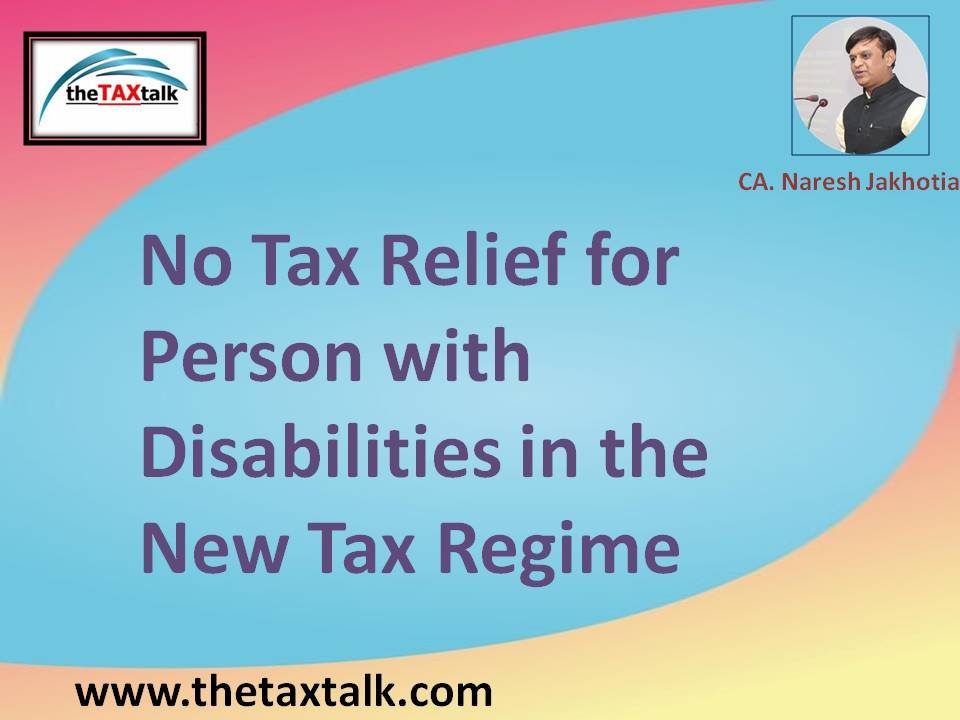![]()
No Tax Relief for Person with Disabilities in the New Tax Regime
Query 1]
- Is there any special provision of tax exemption for permanently disabled employees?
- Tax exemption under section 80DD & 80U is admissible for private sector salaried employees under the new tax regime?
Opinion:
In today’s society, advocating for inclusivity & support to individuals with disabilities is not just a moral imperative but also a legal and societal obligation. Amidst the myriad challenges that individuals with disabilities encounter, there are certain tax benefits for their empowerment and assistance. Income Tax Act offers special deduction to the person suffering from permanent physical disability under the old tax regime. The deduction is either available to the person suffering such permanent disability or can be claimed by the person taking care of the dependent disabled person. The same is admissible U/s 80DD or 80U. Let us know about it.
Deduction u/s 80DD::
Section 80DD offers deduction to an individual/HUF if (i) any expenditure is incurred on the medical treatment (including nursing), training and rehabilitation of a dependant with a disability or (ii) amount is paid/deposited under a scheme framed in this behalf by an insurer for the maintenance of a dependant with a disability.
The deduction admissible is a fixed sum of Rs. 75,000/- for normal disability & Rs. 1,25,000/- for severe (80% or more) disability. It’s an ad-hoc deduction & not dependent on actual expenses. Even if the actual expense on above mentioned disabled dependent relatives is less, still a full amount of deduction would be available.
What is considered as disability and Severe Disability?
The following disabilities are eligible for deduction u/s 80DD:·
. Blindness
. Low vision
- Leprosy-cured
- Hearing impairment
- Locomotors disability
- Mental retardation
- Mental illness
- Autism
- Cerebral palsy
- Multiple disabilities
[A person with disability means a person suffering from not less than 40% of any of the above disabilities. Severe disability means 80% or more of one or more of the above disabilities.] Meaning of Dependent:
i] For individuals, spouse, son / daughter, parents, brothers & sisters
ii] For HUFs, any member of the HUF can be a disabled dependent.
The disabled person should be wholly or mainly dependent for his / her support and maintenance, and should not have claimed deduction under section 80U.
Deduction u/s 80U:
If the person with disability is not dependent and has an independent source of income then such taxpayers can claim deduction u/s 80U. Deduction is a fixed sum of Rs. 75,000/-. A higher amount of Rs. 1.25 Lakh is available as deduction if the person is suffering with severe disability (80% or above). [Deduction u/s 80DD is available to the person who is incurring expenditure on the medical treatment of a dependant].
Whether Deduction u/s 80DD or 80U is admissible in case of taxpayers opting for the new tax regime:
New Tax Regime, though offers concessional tax rate, restricts the claim of various deductions & exemption. Few of the common deduction which majority of the taxpayers are claiming under old regime but not available under the new regime are as under:
- Deductions u/s 80C up to Rs. 1.50 Lakh towards LIC/PPF/Housing Loan Principal repayment, etc
- Deductions u/s 80CCD(1B) up to Rs. 50,000 towards National Pension Scheme.
- Deduction up to Rs. 30,000/- towards mediclaim & preventive health check up (Parents mediclaim deduction is not claimed by many & hence ignored).
- HRA / LTC deductions by salaried taxpayers
- Rs. 10,000/- saving bank account interest u/s 80TTA (Rs. 50,000/- by senior citizens u/s 80TTB)
- Housing Loan interest up to maximum of Rs. 2 Lakh by taxpayers who have availed housing loan.
In short, the deduction U/s 80DD & 80U is not available if the person is opting for the new tax regime.
Conclusion:
Under the new tax regime, Section 80DD & 80U offers no benefit. Consequently, both average individuals and those with disabilities would have equal tax burdens. This uniform approach fails to acknowledge the additional financial strains experienced by people with disabilities, stemming from medical costs, assistive technologies, and specialized care. Despite apparent parity in tax liabilities, the economic realities for disabled individuals remain notably disparate and often more demanding. To address this imbalance and foster equity within the tax structure, the Government ought to contemplate offering incentives or tailored benefits for individuals with disabilities. Such measures would contribute to advancing inclusivity and fairness in our society. Hope the New Government will take action to address this issue and extend benefits to people with disabilities.
[Views expressed are the personal view of the author. Readers are advised to seek professional advice before taking any decisions. Readers may forward their feedback & queries at nareshjakhotia@gmail.com. Other articles & response to queries are available at www.theTAXtalk.com]

